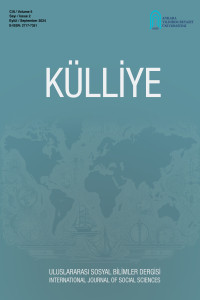Öz
Sophistry is an illogical step in the formulation of an argument. Although politics, law and the media are notorious for these tricks, sophisms is part of everyday life and are often committed unintentionally. We even make them ourselves. Since sophisms can make illogical arguments seem logical, deceivers use them to persuade their audiences to believe illogical claims. Only by learning to recognise sophistry can we avoid being deceitful and misled by others. This paper focuses on one of these sophisms and a common fallacies in western philosophy, the ‘Petitio Principii’ or 'begging the question'. Petitio Principii is a logical fallacy in which the premise of an argument presupposes the truth of its conclusion; in other words, the argument takes for granted what it is supposed to prove. Petitio Principii appears in writings on informal logic. Although its constant appearance testifies to its importance, remarkably, the analysis of the petitio has not made any significant progress since Aristotle's first treatment of it. Our aim in this paper is to make the beginning of a systematic theoretical analysis of this sophistry.
Anahtar Kelimeler
Kaynakça
- Aristoteles, (1996). Organon III: Birinci Analitikler. (Çev: H.R. Atademir), Milli Eğitim Basımevi.
- Bulut, U. (2022). Yargıtay Uygulamasında “Borcu Söndüren Belge” ve İleri Sürülmesi Bakımından Usûlî Sorunlar, İzmir Barosu Dergisi, 87(2), 113-157.
- Castagnoli, L. (2013). Aristotle On Begging The Question Between Dialectic. Logical Analysis and History of Philosophy içinde (90–121. ss.), U. Meixner, A. Newen (Ed.) Vol. 15, Germany: Brill mentis; https://doi.org/10.30965/9783897858589_005
- Creighton, J. E. (1919). An lntroductory Logic. The Macmillan Company.
- Emiroğlu, İ. (1993). “Petitio Principii Nedir?”. Felsefe Dünyası, sayı: 9, 65-74.
- Fogelin, R. J., and Sinnott-Armstrong, W. (2014). Understanding Arguments: An Introduction to Informal Logic (9th ed.). Wadsworth Cengage Learning.
- Grünberg T., Grünberg, D., Onart A. & Turan, H. (2003). Mantık Terimleri Sözlüğü. ODTÜ Geliştirme Vakfı. Hamblin, C. L. (1970). Fallacies, Methuen and Co.
- Hazlett, A. (2006). Epistemic Conceptions of Begging the Question. Erkenntnis, 65(3), 343–363.
- Iacona, A. & Marconi, D. (2005). Petitio principii: What’s wrong? Facta Philosophica, 7(1), 19 –34; https://doi.org/10.3726/93519_19
- Janis, I. L. (1968). Persuasion, David L. Sills (Ed.), İnternational Encyclopedia of The Social Sciences içinde (55-65. ss.), Volume 13 and 14, New York: Crowell Collier and Macmillan Publishing Company.
- Mill, J. S. (1967). A System of Logic Ratiocinative and Inductive, London.
- Platon (2015). Timaios. (Çev: F. Akderin), Say Yayınları.
- Proudhon, P. J. (2017). Mülkiyet Nedir?. (Çev: D. Çetinkasap), Türkiye İş Bankası Kültür Yayınları. Rescher, N. (1964). Introduction to Logic. St. Martin's Press.
- Sgaravatti, D. (2013). Petitio Principii: A Bad Form of Reasoning, Mind, 122(487), 749–779; https://doi.org/10.1093/mind/fzt086
- Woods, J. and Walton, D. (1989). Fallacies: Selected Papers 1972–1982. Dordrecht-Holland/ Providence.
- Woods, J.& Walton, D. (1975). Petitio Principii. Synthese, 31(1), 107-127.
Öz
Safsata, bir argümanın formülasyonundaki mantıksız bir adımdır. Siyaset, hukuk ve medya bu hilelerle ün salmış olsa da, safsatalar günlük yaşamın bir parçasıdır ve genellikle kasıtsız olarak işlenmektedir. Hatta bunları kendimiz bile yaparız. Safsatalar mantıksız argümanları mantıklı gösterebildiğinden, düzenbazlar izleyicilerini mantıksız iddialara inanmaya ikna etmek için bunları kullanmaktadır. Ancak safsataları tanımayı öğrenerek, hilekâr olmaktan ve başkaları tarafından yanlış yönlendirilmekten kaçınabiliriz. Bu çalışma bu safsatalardan ve batı felsefesindeki yaygın yanılgılardan biri olan ‘Petitio Principii’ ya da 'soruyu dileme'ye odaklanmaktadır. Petitio Principii, bir argümanın öncülünün, sonucunun doğruluğunu varsaydığı mantıksal bir yanılgıdır; başka bir deyişle argüman, kanıtlaması gereken şeyi olduğu gibi kabul etmektedir. Petitio Principii informel mantık üzerine yazılan yazılarda karşımıza çıkmaktadır. Sürekli ortaya çıkması önemine tanıklık etse de, dikkat çekici bir şekilde, petitio principii’nin analizi Aristoteles'in onu ilk ele alışından bu yana kayda değer bir ilerleme göstermemiştir. Bu çalışmadaki amacımız, bu safsatanın sistematik bir teorik incelemesinin başlangıcını yapmaktır.
Anahtar Kelimeler
Kaynakça
- Aristoteles, (1996). Organon III: Birinci Analitikler. (Çev: H.R. Atademir), Milli Eğitim Basımevi.
- Bulut, U. (2022). Yargıtay Uygulamasında “Borcu Söndüren Belge” ve İleri Sürülmesi Bakımından Usûlî Sorunlar, İzmir Barosu Dergisi, 87(2), 113-157.
- Castagnoli, L. (2013). Aristotle On Begging The Question Between Dialectic. Logical Analysis and History of Philosophy içinde (90–121. ss.), U. Meixner, A. Newen (Ed.) Vol. 15, Germany: Brill mentis; https://doi.org/10.30965/9783897858589_005
- Creighton, J. E. (1919). An lntroductory Logic. The Macmillan Company.
- Emiroğlu, İ. (1993). “Petitio Principii Nedir?”. Felsefe Dünyası, sayı: 9, 65-74.
- Fogelin, R. J., and Sinnott-Armstrong, W. (2014). Understanding Arguments: An Introduction to Informal Logic (9th ed.). Wadsworth Cengage Learning.
- Grünberg T., Grünberg, D., Onart A. & Turan, H. (2003). Mantık Terimleri Sözlüğü. ODTÜ Geliştirme Vakfı. Hamblin, C. L. (1970). Fallacies, Methuen and Co.
- Hazlett, A. (2006). Epistemic Conceptions of Begging the Question. Erkenntnis, 65(3), 343–363.
- Iacona, A. & Marconi, D. (2005). Petitio principii: What’s wrong? Facta Philosophica, 7(1), 19 –34; https://doi.org/10.3726/93519_19
- Janis, I. L. (1968). Persuasion, David L. Sills (Ed.), İnternational Encyclopedia of The Social Sciences içinde (55-65. ss.), Volume 13 and 14, New York: Crowell Collier and Macmillan Publishing Company.
- Mill, J. S. (1967). A System of Logic Ratiocinative and Inductive, London.
- Platon (2015). Timaios. (Çev: F. Akderin), Say Yayınları.
- Proudhon, P. J. (2017). Mülkiyet Nedir?. (Çev: D. Çetinkasap), Türkiye İş Bankası Kültür Yayınları. Rescher, N. (1964). Introduction to Logic. St. Martin's Press.
- Sgaravatti, D. (2013). Petitio Principii: A Bad Form of Reasoning, Mind, 122(487), 749–779; https://doi.org/10.1093/mind/fzt086
- Woods, J. and Walton, D. (1989). Fallacies: Selected Papers 1972–1982. Dordrecht-Holland/ Providence.
- Woods, J.& Walton, D. (1975). Petitio Principii. Synthese, 31(1), 107-127.
Ayrıntılar
| Birincil Dil | Türkçe |
|---|---|
| Konular | Mantık |
| Bölüm | Araştırma Makaleleri |
| Yazarlar | |
| Erken Görünüm Tarihi | 25 Eylül 2024 |
| Yayımlanma Tarihi | 30 Eylül 2024 |
| Gönderilme Tarihi | 5 Aralık 2023 |
| Kabul Tarihi | 8 Mart 2024 |
| Yayımlandığı Sayı | Yıl 2024 Cilt: 5 Sayı: 2 |


